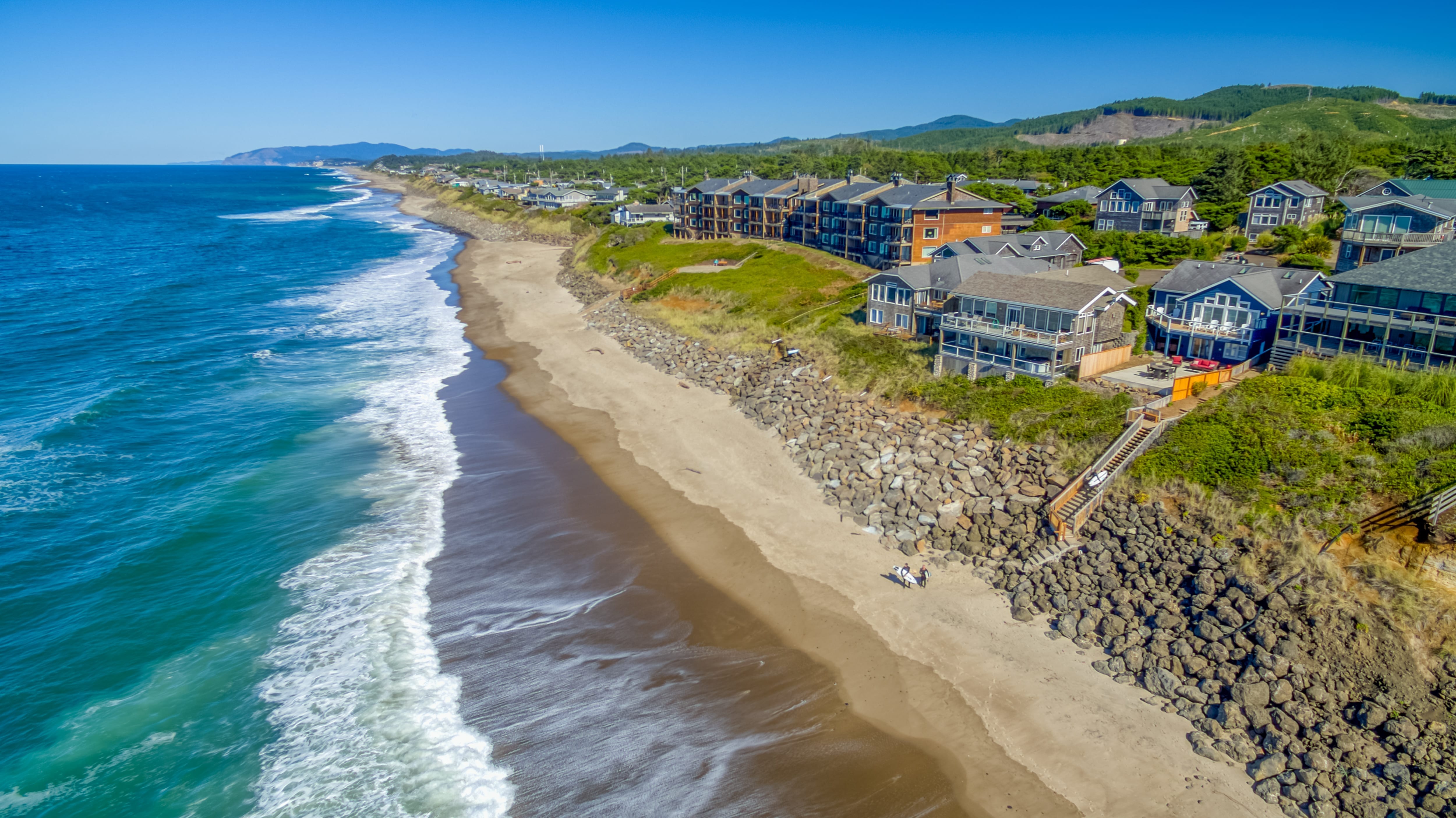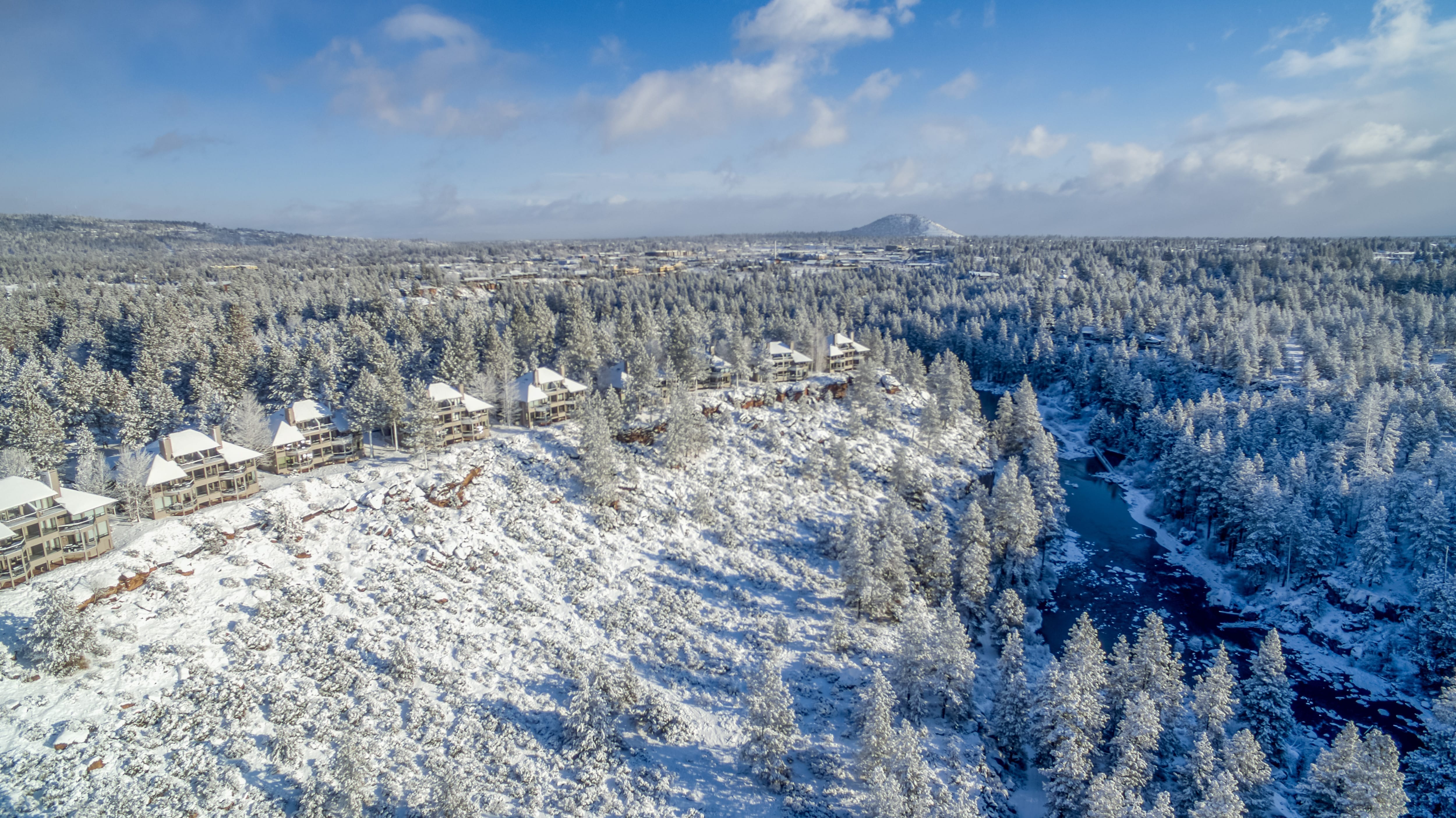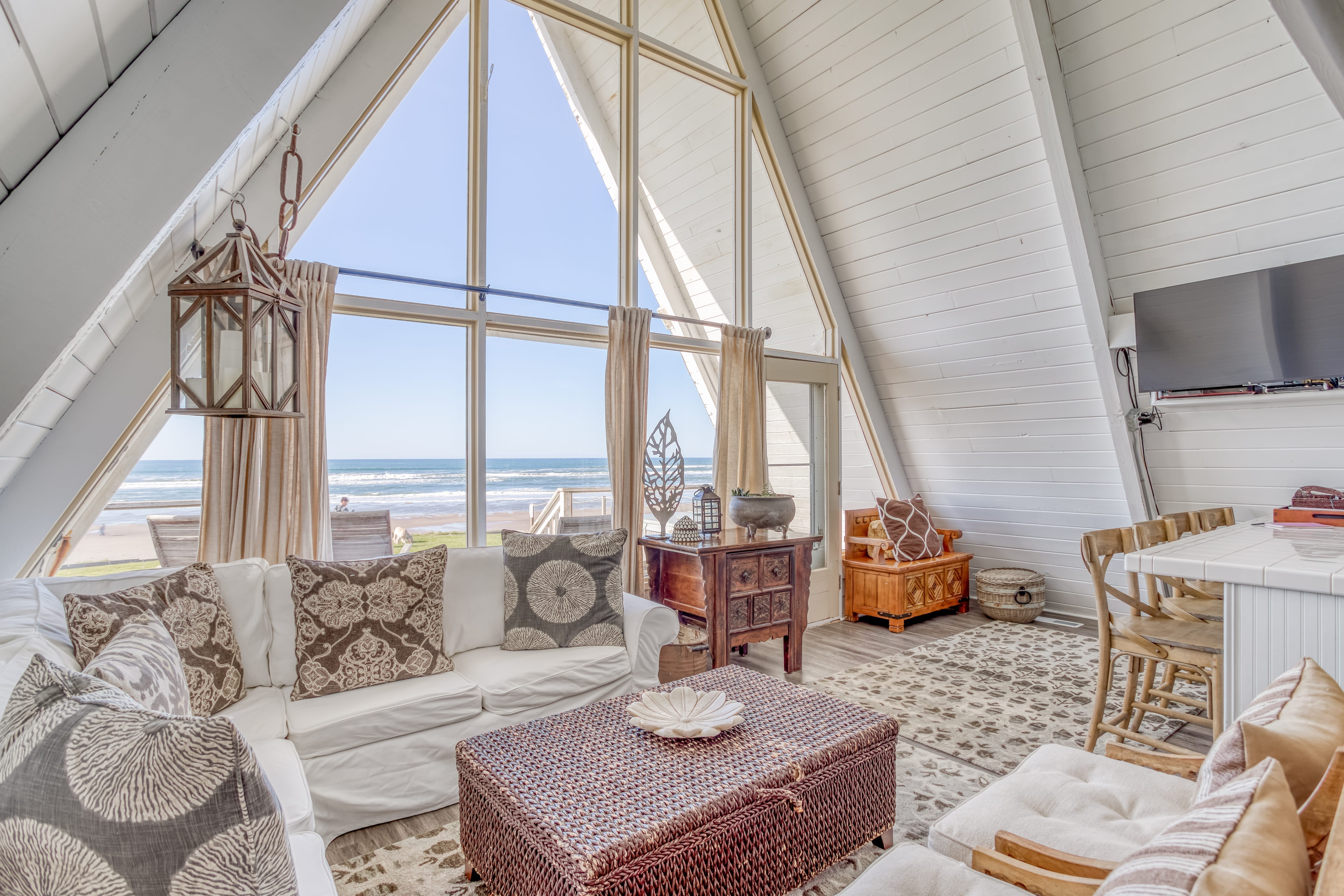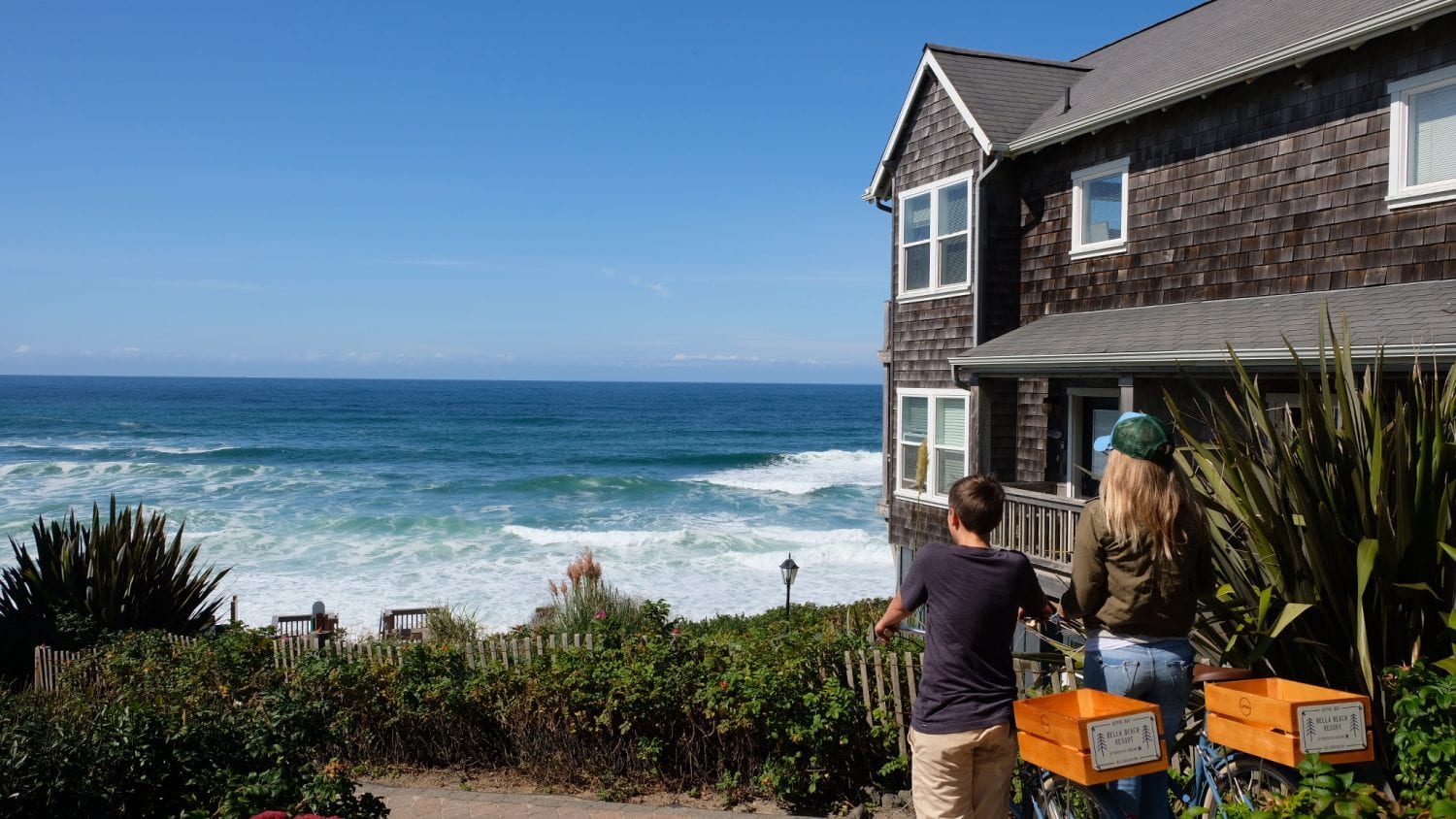Meredith Oksenholt and son, EJ, keeping an eye out for passing whales in the Bella Beach community of Depoe Bay.
As with many vacation rental business owners, 40-somethings Jon and Meredith Oksenholt didn’t set out to build one of Oregon’s fastest growing, full-service, 700-unit vacation rental businesses operated by upwards of 200 staff members. It started with one thoughtful decision, marshalling the talents of good people and … some chutzpa.
After graduating from Walla Walla University in Washington with a degree in business management, Jon headed to the University of Washington School of Law. But instead of taking the bar exam, he opted for the Oregon Construction Contractor’s Board (CCB) exam.
“Everybody thought I was crazy,” he said.
Maybe crazy as a red fox, because this go-getter has been successfully investing in real estate ever since. Yet, this entrepreneur’s success in vacation rental management, goes back even further to his hands-on housekeeping days as an office janitor.
“I was 18 years-old when I was able to purchase my first piece of property and I did that with income from being a janitor and moving my way up to running a crew of janitors who were older than I was,” he explains.
Jon has come a long way since that time.
While he was still in law school, he became a partner in the development of seaside resort community Bella Beach. After school, he returned to Lincoln City, where he was born and raised and began applying his management and leadership skills to local real estate development opportunities.
Not long after, he met Meredith while she was on a vacation with her family who owned a beach home in the Salishan Resort development near Gleneden Beach. When they met, Meredith, who earned a degree in early childhood education from Oregon State University, was gaining hands-on managerial experience successfully running her own business—a day school for toddlers in Portland.
After developing and building some projects together, Jon and Meredith saw and seized on business opportunities and through their partnership, the business began to grow. In 2012, the owners of homes they had developed and built approached them and asked them to manage them as vacation rentals, and the business that became Meredith Lodging was born. Currently, Jon is CEO and Meredith is president and chief branding officer.
Today, despite a year of enduring the global pandemic, raging forest fires and personal family challenges, by operating under the same enduring guiding principles, like a phoenix, Meredith Lodging has literally risen from the ashes (at least a lot of smoke) to see the light of brighter days ahead.
With Meredith tending to their 13-year-old son, E.J., who is recovering from an autoimmune illness, we caught up with Jon on a sunny winter afternoon after he just returned from the mountain community of Bend, Oregon (Meredith Lodging has regional headquarters offices in both Bend and Lincoln City). Here are highlights from our conversation.

VRMI: How did Meredith Lodging begin?
Oksenholt: I recognized that many folks in the secondary home markets want to be able to afford to at least offset a portion of their mortgage, use the home on occasion, and rent it out. After selling a number of homes, homeowners would call Meredith and me and say they wish they had a different management company, because their home wasn’t properly cared for, and they weren’t getting the income they wanted. We had a group of homeowners within a neighborhood that came to us and asked us to manage their homes, and that’s how we started.
VRMI: How does being born and raised in the area play into your company?
Oksenholt: Certainly, the fact that we’re known where we started really helped get things started. And we’re still a family-owned, locally-based company to this day. To their credit, a lot of the owners in our program care about the roots of the businesses they trust to manage their home, where that business is headquartered, whether the business is a national operator with remote personnel working out of the region or out of the state. We keep physical offices in the locations we serve and that is a big deal to the homeowners in our program. It matters to our homeowners that we are local, that we have deep, family roots along the coast and in Central Oregon and that a lot of our employees do, too. We are less corporate, more of a family business, and our owners like that; they relate. And many of our employees who have been with us since the beginning—including our first employee ever—are still with us to this day. They too have become a part of the Meredith Lodging brand, because our homeowners know them and relate to them.

VRMI: Is it possible to define your customer or does it depend on if you are speaking of the coast or the mountains?
Oksenholt: Actually, in Oregon, there’s a big crossover of owners that own in both markets, but certainly on the on the guest side, sometimes they want to go to the mountains, and they want to go to the beach. And the great thing about Oregon is that our beach and mountain markets are not that far apart. So, you can spend time in both easily.
We predominantly attract families, and when kids are out of school, occupancy is always higher. Currently, with the pandemic and other recent events, it’s predominantly families looking to vacation in a way that feels safe, families who are taking their daily routine of work-from-home/online school on the road—or remote workers looking for a change of scenery.
VRMI: What is your secret to such successful employee retention?
Oksenholt: I think when you assemble a good group of people that have the qualities that I always look for, which are adaptability and loyalty, they attract additional folks that are likeminded. And over time, it comes to what Meredith talks about all the time, which is to say it becomes a work family. You form these bonds and relationships, and you try to build off that.
On the employee side, it really does matter how you pay and how you treat your employees. My philosophy has always been, pay the best, and you get the best. A number of years ago, I set everything at a minimum of $15 an hour and other companies followed suit. Since then, we have always paid the highest rates for seasonal workers in the industry in Oregon. Last summer, when everyone was laying folks off and things were bad, I said, ‘Look, we’re going to take a high season rate and instead of reducing wages during a pandemic we’re going to make our minimum wage $19.19 per hour.’
Beyond pay and benefits, the work environment and our headquarters offices matter. We have places where people can bring their dogs and their kids. We have a whole game room set up at the Oregon coast as well as one in Bend. People like all those things. It’s a different world today right now because of the coronavirus, but those little things can sometimes make big differences.
Also, on the heels of my son’s illness, and understanding firsthand what it’s like when an employee is sick or has a sick family member, we have formed an employee giving fund. We gave our first grant to help an employee who is going through an autoimmune condition. So, we’re constantly trying to get better and grow and adapt ourselves.
VRMI: Share an example of where Meredith Lodging excels.
Oksenholt: We are flexible in our thinking and we are constantly finding better ways to do things in terms of our service to owners and guests. Because we are a local, family-owned business, we are able to move more quickly and nimbly than the national businesses we compete with. If we have something that we’ve done for a long time, and all of a sudden, somebody says, ‘Hey, I think this is a better way to do it,’ whether it’s an internal innovation or something that we hear from another company, we’re very good at implementing it and trying it right away without a lot of red tape. We’re good at adapting quickly, experimenting and testing.

VRMI: Has it been a challenge to keep your culture sound as you grow?
Oksenholt: It is challenging. That’s exactly why we’ve intentionally grown. Everyone asks, ‘How’d you grow so fast? You were the 29th fastest in Oregon, again [on The Portland Business Journal’s list of Top 100 Fastest-Growing Private Companies in Oregon].’ But actually, we could grow much more quickly. But we don’t want to lose who we are, and so for us, growing intentionally is key.
VRMI: I understand your governor shut down the state for six weeks. How did COVID impact Meredith Lodging?
Oksenholt: I like to think I’m pretty good at forecasting things, but no one saw that coming. So, when it happened, just out of the blue, and very quickly, it was an immediate and huge challenge. We saw a competitor, the largest hospitality employer in the state of Oregon, laying off 2,000 of their employees and we braced ourselves for a similar blow. But we were very slow to lay off what was a small fraction of our workforce. It’s the toughest thing, but actually, by the time we implemented layoffs, they passed the CARES Act and…we started rehiring and returned to our pre-pandemic employment numbers as quickly as possible.
VRMI: Did you have to pivot and, if so, how?
Oksenholt: I would say we were very quick in adapting—to give one small example, buying extra toilet paper, because there were toilet paper shortages and we needed to be able to supply it in all of our rentals—and the team was very good at complying with everything that came down in terms of market-specific travel policies and buying the best of technology. But we certainly did bleed. We lost a lot of money in a four-week period.
No doubt, economically and morale-wise it’s a challenging time, no question. And on the personal side, despite my son’s illness, I had to get a little more involved and we had to swiftly make certain decisions. What we didn’t do is we didn’t have knee-jerk reactions. We really discussed, we huddled together as a team. Over the phone, we got everyone involved. The most important thing was the communication piece because everyone’s scared, no one knows what’s happening or what to do next with certainty. What I made sure of is we had real honest communication, so that everyone’s hearing the same thing at the same time, and then sharing that with their teams.
We rolled up our sleeves, we needed to do things like try to keep our employees busy, even as cancellations increased and reservations dwindled. We kept our folks busy doing deep cleans and even offering it for free in some cases, if necessary. The one thing I knew is that it would not last forever. I think our homeowners appreciated that we stayed in touch communicating with them also, checking on their homes. And then on the heels of the shut-downs, we had the fires.
VRMI: Yes, the fires started in mid-August. How did that impact you?
Oksenholt: Actually, one of the pictures that was going around the internet was a piece of land I own burning. No one could get anywhere. There was a lot of smoke. Close to half of our portfolio was impacted. We had several employees who had to flee their homes with nothing more than the clothes on their backs, and many more who couldn’t return to their homes for days after. Along with our owners, we switched gears quickly to focus on humanitarian efforts. We reached out to our amazing, generous, and kind homeowners and, thanks to them offering up their homes, we were able to offer housing and a warm, safe place to go to many who had had been displaced. We were able to provide transitional housing in available vacation rentals at no charge to those impacted.
In terms of the impact of the fires on our day-today, we were in the middle of one of our busiest times of year when the fires hit…and we went from fully booked to emergency evacuations to zero in many markets. In terms of dollars lost to the business, the number was astronomical, I’d say seven digits.

VRMI: What did you learn?
Oksenholt: The pandemic and the Oregon wildfires taught us a lot. More than anything, I think those events taught us to follow our instincts. We kept more people on than we were advised to, first and foremost because these employees feel like family—and our gut feeling was that once people are able to travel, our homes are going to be a highly desirable option.
You could argue that we could have hurt less financially, because we could have laid everyone off. But, when you have a massive payroll, and you keep a high percentage of that, and factor in loss of revenue, it is what it is. Now that it’s been done, I will say any loss or struggle has been well worth it, because of the way we were able to scale back up so quickly and be fully operational, we have seen, on the positive side, demand like we’ve never seen it. People want to travel closer to home, they want to be in wide open and beautiful spaces, and they are looking to travel. There was a pivot to this and a clear demand for this.
VRMI: What was the biggest challenge?
Oksenholt: Every market has different regulations, and they are dynamic, which is a lot to track when you’re in so many markets, so the learning curve this year has been constant as there were spikes up and spikes down. On the positive side, the season was longer and has continued beyond the time when folks go back to school. Instead, demand increased into October and people were working remotely on Flexcations … that was a positive for us.
VRMI: Do you think that’s a trend that will continue?
Oksenholt: I know a lot of people are going to want to continue to work remotely and companies like it. I do believe that there will be some continued increase in demand for this product from folks that normally would be looking at hotels. And with flex scheduling, online school and working remotely, I do expect there will be some uplift in demand for vacation rentals coming out of this. It has increased the appetite for vacation rentals more than I’ve ever seen.
Photo credits: Emily Castleberry and Kim Holloway Kripalani



Wow…what a success story….congratulations to the Oskenholt family!!!
I have followed Meredith Lodging for a few years…watching their portfolio of homes under management grow grow grow….and on a couple of occasions have reached out to introduce myself…but have not had my messages returned….ouch!
We have 250+ ocean view acres zoned for vacation rentals….and think we should at least have a conversation….Create something similar to Seabrook…but we’re too old….You can do it!!!!! Or at least give us a hand?
Please contact me…..
Rich Marshall
Ilwaco, WA